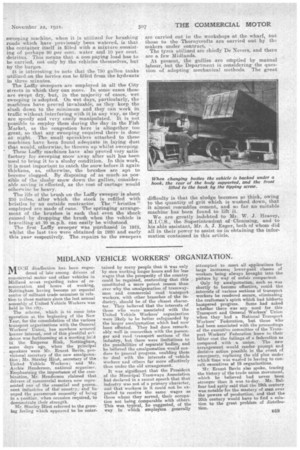MIDLAND VEHICLE WORKERS' ORGANIZATION.
Page 19

If you've noticed an error in this article please click here to report it so we can fix it.
MUCH disaffection has, been engen dered of late among drivers of commercial motor and other vehicles in Midland areas regarding. rates of remuneration and hours of working, Nottingham having become an especial centre of militant trade unionism in relation to these matters since the last annual assembly of United Vehicle Workers was held in the city. The scheme, which is to come into operation at the beginning of the New Year, for the consolidation of the various transport organizations with the General Workers' Union, has nowhere aroused keener interest, and of this plentiful evidence was forthcoming at a meeting 'ne:d in the Empress Rink, Nottingham, some days ago. When the principal speakers were Mr. Ernest Bevin„ provisional secretary of the new amalgamation; Mr. Stanley Hirst, secretary of the United Vehicle Workers; and 'Mr. Archie Henderson, national organizer. -Emphasizing the importance of the combination, Mr. Henderson claimed that 'drivers of commercial motors now represented one of the essential and perina, nent industries of the country,, and' he urged the paramount necessity of being in a position, when occasion required, to demonstrate their strength.
Mr. Stanley Hirst referred to the growing feeling which appeared to be enter tained by many people that it was only by men working longer hours and for less wages that the prosperity of the country could be regained, contending that this constituted a more potent reason than over why the amalgamation of tramwaymen and commercial road transport workers, with other branches of the industry, should be of the chest character. They believed that the interests of those who were associated with the United Vehicle Workers' organization were likely to be better safeguarded by the larger amalgamation which had now been effected. They had done remarkably well in connection with the passenFor and road transport sections of the industry, but them were limitations to the possibilities a separate bodies, and he believed the amalgamation would conduce to general progress, enabling them to deal with the interests of vehicle workers and others far more effectively than under the old arrangement.
It was significant that the President of the Municipal Tramways Association had declared in a recent speech that that industry was not of a primary character, and that workers in it could not be expected to receive the same wages as those whom they served, their occupation not beini comparable with others. This was typical, he suggested, of the way in which employers generally
attempted to meet, all applications for large increases, lower-paid classes of workers being always brought into the picture by way of unfair comparison.
Only by amalgamation, such as was shortly to become effective, could the interests of various sections of transport workers be rendered secure, eliminating the craftsman's spirit which had hitherto hampered progress. Some had asked whether there was any need for this Transport and General Workers' Union when they had a National Transport Workers' Federation, but those who had been associated with the proceedings of the executive committee of the Transport Workers' Federation knew to their bitter cost the failings of a federation as compared with a union. The new arrangement would render prompt and decisive action possible in the event of .emergency, replacing the old plan under which' time was wasted in having to consult exeeutives of 19 organizations.
Mr. Ernest Bevin also spoke, tracing the history of the trade union movement, which he believed had never been stronger than it was to-day. Mr. Balfour had aptly said that the 19th century was notable-for the mastery of man over the powers of production, and that the 20th century would have to find a solution to the great problem of distribution.








































